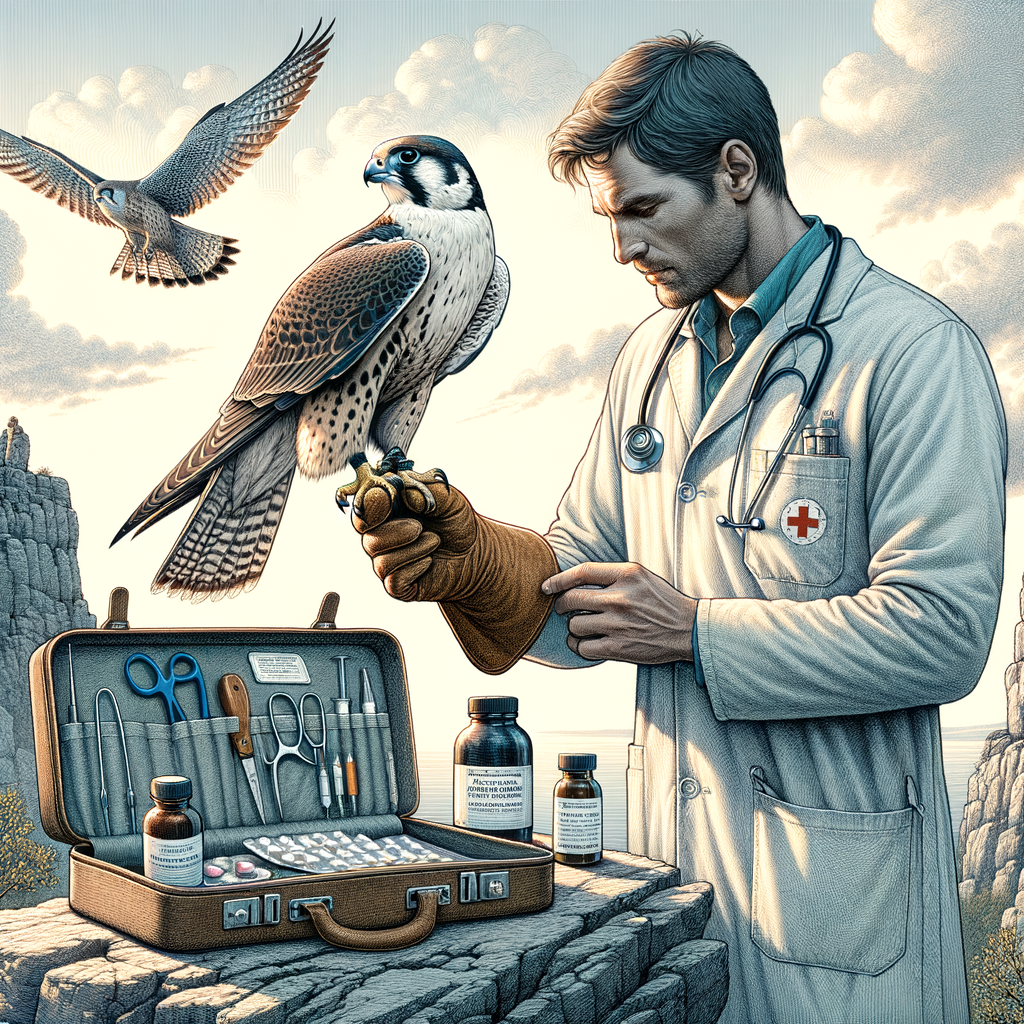Preventative Health Care for Falcons
-
Regular Health Check-Ups
- Ensure your falcon gets routine medical examinations.
- Early detection of health issues can prevent serious problems.
-
Balanced Diet
- Provide a variety of fresh, natural foods.
- Supplements might be necessary for complete nutrition.
-
Clean Environment
- Keep living spaces clean to prevent disease.
- Regularly disinfect perches, water sources, and feeding areas.
-
Proper Training
- Engage in consistent and appropriate training exercises.
- Helps maintain physical fitness and mental sharpness.
-
Identification and Reporting of Symptoms
- Learn to recognize signs of illness like changes in appetite or behavior.
- Report any health concerns to a veterinarian immediately.
-
Vaccination and Parasite Control
- Stay up to date with vaccinations.
- Implement regular deworming and flea treatments to avoid parasitic infections.
-
Mental and Physical Stimulation
- Provide toys and varied activities to keep your falcon engaged.
- Ensures overall well-being and happiness.
-
Hydration
- Always have fresh water available.
- Clean water dishes daily to prevent contamination.
-
Proper Weight Management
- Monitor weight regularly.
- Adjust diet and exercise to maintain an ideal weight.
-
Shelter and Weather Protection
- Provide adequate shelter from harsh weather conditions.
- Ensure living areas are safe from predators and extreme temperatures.
The Magic of Preventative Health Care for Falcons
Welcome to the world of Learn Falconry, where we are passionate about the majestic art of falconry. Picture yourself standing on the lush green fields of Ireland, watching the magical dance of a falcon in the sky. Just like the vibrant shades of the Irish countryside need the right balance of sun and rain to stay beautiful, our falcons, too, need special care to stay healthy and strong.
This article is your golden ticket to understanding the importance of preventative health care for these extraordinary birds. It’s like a wise old Irish saying ‘ “An ounce of prevention is worth a pound of cure.” Keeping our falcons in top-notch condition ensures they fly higher, hunt better, and live longer.
So, join us as we delve into the essential tips and tricks for maintaining the health of these winged wonders. From diet and exercise to regular check-ups, you’ll learn how to be the ultimate guardian of your falcon’s well-being. Let’s keep reading together and discover the magic of preventative health care for our feathered friends!
Falcon Health Care: Tips for Preventing Falcon Diseases
Falcon health care is incredibly important for all falconers. By preventing falcon diseases, you can ensure your feathered friend stays strong and happy. Being knowledgeable about falconry health tips is vital for anyone involved in this ancient and magnificent art.
Regular Health Check-Ups
One of the most important falconry health tips is to schedule regular health check-ups with a specialist who understands the unique needs of these birds. Just like people, falcons need regular visits to ensure they are in good health and to catch any potential issues early.
To learn more about the special equipment needed for falcon care, visit our falconry equipment page.
Proper Nutrition
Good nutrition is key to preventing falcon diseases. Falcons require a balanced diet rich in proteins and essential nutrients. Make sure to provide fresh, high-quality food like quail or mice and ensure they always have access to clean water.
For detailed nutritional advice, check out our falcon health nutrition section.
Housing and Clean Environment
Keeping your falcon’s living environment clean is crucial. Dirty perches and housing can harbor bacteria and parasites, leading to illnesses. Regularly clean their living spaces, perches, and feeding bowls.
Learn more about how to properly set up a falcon’s housing in our guide on mews and housing.
Preventing Parasites
Parasites such as mites and worms can pose a significant threat to falcon health. Regularly check your bird for signs of infestations and consult with a vet about preventative treatments.
To learn more on how to control parasites, visit our page on parasite control for falcons.
Weight Management
Maintaining the proper weight is important to keep your falcon healthy and agile. Obesity can lead to various health problems, while being underweight can weaken the bird. Regularly weigh your falcon and adjust their diet accordingly.
For more detailed information, explore our article on weight management for falcons.
Exercise
Just like humans, exercise is important for falcons. It helps maintain their weight and keeps their muscles strong. Regular flying sessions and training can ensure your falcon stays fit.
Find out more about different training techniques in our section on training a falcon.
Hydration
Keeping your falcon well-hydrated is essential. Always ensure they have access to fresh, clean water, especially during hot weather.
For more hydration tips, visit our article on hydration for falcons.
Seasonal Health Care
Different seasons bring different challenges. For example, colder weather can affect your falcon’s health, while hotter days can lead to dehydration. Adjust your care routine depending on the season to keep your falcon healthy throughout the year.
For more information on seasonal care, see our article on seasonal health care for falcons.
Stress Management
Stress can be harmful to falcons. Changes in environment, handling, or loud noises can stress them out. Creating a calm and stable environment is crucial to prevent stress-related health issues.
Learn more about stress management in our guide on handling falcon stress.
By following these falconry health tips and staying informed, you can help prevent falcon diseases and ensure your bird remains in peak condition.
For a deeper dive into the history and techniques of falconry, visit our history of falconry and falconry techniques sections. Happy flying!
Preventative Health Care for Falcons in 2024
Falcons are majestic and powerful birds, but taking care of them requires knowledge, attention, and commitment. To keep your falcon healthy, it’s crucial to understand the preventive measures you can take. Here, we’ll explore some important strategies to ensure your falcon stays in top condition.
Clean and Safe Environments
Keeping your falcon’s environment clean is essential to avoid diseases. Ensure that their enclosures are well-maintained and free from contaminants.
| Measurement | Frequency | Purpose |
|---|---|---|
| Enclosure Cleaning | Daily/Weekly | Reduce the risk of disease transmission |
| Water Replacement | Daily | Prevent waterborne diseases |
| Equipment Sanitizing | Weekly | Ensure all contact surfaces are safe from pathogens |
Proper Nutrition
Falcons need a balanced diet to stay healthy. Feed them whole carcasses of adult prey items that closely resemble their natural diet. This can help prevent metabolic bone disease, a common issue in birds of prey.
| Nutrient | Source | Benefits |
|---|---|---|
| Protein | Whole prey (e.g., mice) | Muscle development and energy |
| Calcium | Bone fragments in prey | Bone strength and development |
| Vitamins | Organ meat | General health and immune system support |
Stress Reduction
Raptors, including falcons, are sensitive to stress, which can lead to a weakened immune system. Minimizing stress is crucial for their well-being.
| Stressor | Solution | Benefit |
|---|---|---|
| Unpredictable handling | Consistent handling routine | Prevents stress-induced immunosuppression |
| Noise and disturbances | Quiet and stable environment | Provides a calm habitat that enhances overall well-being |
Regular Health Checks
Conduct regular health checks to catch any signs of disease early. This proactive approach allows for timely intervention and treatment.
| Check-Up Type | Frequency | Purpose |
|---|---|---|
| Physical Exam | Monthly | Early detection of physical abnormalities |
| Weight Monitoring | Weekly | Ensuring healthy growth and timely illness detection |
| Blood Tests | Bi-Annually | Monitoring internal health and detecting infections early |
Aspergillosis Prevention
Aspergillosis is a common fungal infection in falcons. Proper hygiene can help prevent this disease. Isolate birds with compromised immune systems to avoid spreading the disease.
| Measure | Implementation | Benefit |
|---|---|---|
| Enclosure Hygiene | Regular cleaning and disinfection | Reduces spore inhalation risk |
| Bird Isolation | Separate housing for sick birds | Prevents cross-infection |
West Nile Virus Prevention
West Nile Virus is transmitted by mosquitoes. Reduce the risk by taking preventive measures like using mosquito nets and traps.
| Preventive Measure | Implementation | Purpose |
|---|---|---|
| Mosquito Netting | Cover outdoor enclosures | Prevents mosquito access |
| CO2 Mosquito Traps | Install near enclosures | Reduces local mosquito population |
Avian Tuberculosis Prevention
Proper quarantine and sanitation are critical to preventing avian tuberculosis. Quarantine new or sick birds and ensure proper ventilation in enclosures.
| Measure | Implementation | Benefit |
|---|---|---|
| Quarantine Procedures | Dedicated area for isolation | Prevents disease transmission |
| Ventilation Improvement | Adequate airflow in enclosures | Reduces the concentration of airborne pathogens |
Salmonella Prevention
Salmonella can spread through contaminated food and water. Proper food handling and clean enclosures can minimize the risk of this bacterial infection.
| Measure | Implementation | Benefit |
|---|---|---|
| Food Handling | Proper storage and handling practices | Prevents Salmonella contamination |
| Enclosure Cleaning | Regular sanitation | Maintains a hygienic living environment |
By following these resources and guidelines, you’ll be on your way to providing excellent preventative health care for your falcon in 2024. Take each measure seriously, and always strive to ensure the best possible environment for your majestic companion.
Keeping Your Falcons Healthy and Thriving
Ensuring the health of your peregrine falcon is essential to maintaining a thriving and happy bird. By following key measures, you can help prevent diseases and keep your falcon in top shape.
First, maintaining clean and well-ventilated enclosures is fundamental. It’s crucial to regularly clean your bird’s environment to minimize the risk of disease transmission. Proper nutrition is equally important. Feed your falcon a balanced diet, similar to what they would eat in the wild, to prevent issues like metabolic bone disease. Minimizing stress through thoughtful handling and housing will also bolster their immune system and resistance to illnesses.
Specific preventative measures target common falcon health threats. For aspergillosis and avian tuberculosis, keep hygiene high and isolate birds showing any symptoms. To prevent West Nile Virus and salmonella, protect against mosquito bites and maintain strict food handling procedures, respectively.
In addition, practicing general health tips like offering varied natural prey, ensuring safe mews, managing stress, and providing ample exercise is essential for the overall well-being of your falcon. Always prioritize hygiene in your interactions and surroundings.
By integrating these practices into your daily care routine, you can create a healthier, happier environment where your falcon can soar to its full potential. Remember, a healthy falcon is a happy falcon!



